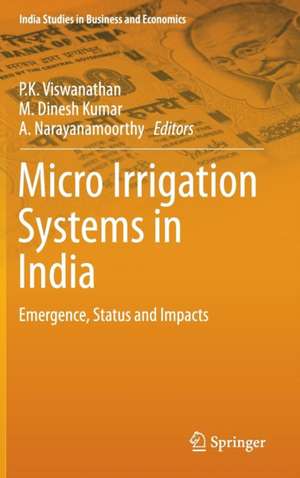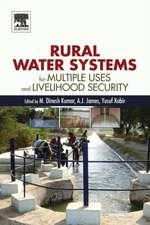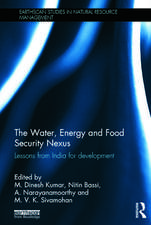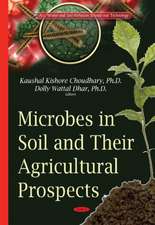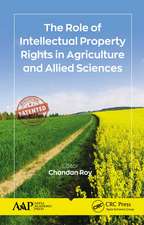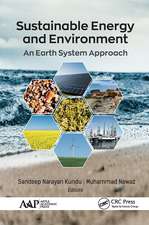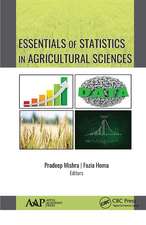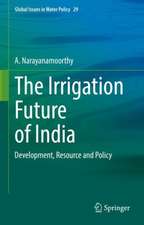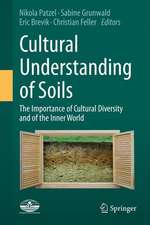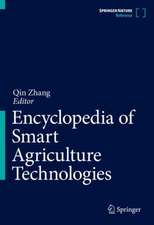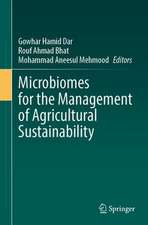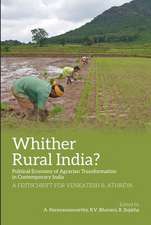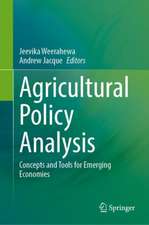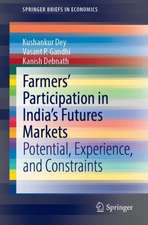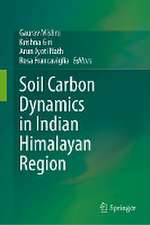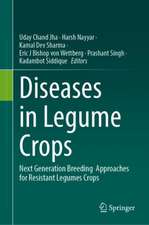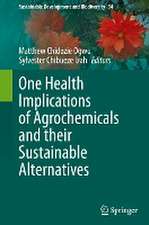Micro Irrigation Systems in India: Emergence, Status and Impacts: India Studies in Business and Economics
Editat de P K Viswanathan, M. Dinesh Kumar, A. Narayanamoorthyen Limba Engleză Hardback – 2 mar 2016
| Toate formatele și edițiile | Preț | Express |
|---|---|---|
| Paperback (1) | 635.31 lei 6-8 săpt. | |
| Springer Nature Singapore – 7 apr 2018 | 635.31 lei 6-8 săpt. | |
| Hardback (1) | 641.53 lei 6-8 săpt. | |
| Springer Nature Singapore – 2 mar 2016 | 641.53 lei 6-8 săpt. |
Din seria India Studies in Business and Economics
- 18%
 Preț: 734.27 lei
Preț: 734.27 lei -
 Preț: 361.77 lei
Preț: 361.77 lei - 18%
 Preț: 1006.24 lei
Preț: 1006.24 lei - 18%
 Preț: 952.89 lei
Preț: 952.89 lei - 20%
 Preț: 883.20 lei
Preț: 883.20 lei -
 Preț: 186.41 lei
Preț: 186.41 lei - 15%
 Preț: 636.94 lei
Preț: 636.94 lei - 15%
 Preț: 647.27 lei
Preț: 647.27 lei - 15%
 Preț: 646.30 lei
Preț: 646.30 lei -
 Preț: 409.89 lei
Preț: 409.89 lei -
 Preț: 372.98 lei
Preț: 372.98 lei -
 Preț: 389.88 lei
Preț: 389.88 lei - 18%
 Preț: 894.03 lei
Preț: 894.03 lei - 15%
 Preț: 644.30 lei
Preț: 644.30 lei - 15%
 Preț: 528.30 lei
Preț: 528.30 lei - 15%
 Preț: 643.65 lei
Preț: 643.65 lei - 15%
 Preț: 644.82 lei
Preț: 644.82 lei - 15%
 Preț: 660.37 lei
Preț: 660.37 lei -
 Preț: 386.00 lei
Preț: 386.00 lei - 20%
 Preț: 559.74 lei
Preț: 559.74 lei - 15%
 Preț: 643.99 lei
Preț: 643.99 lei -
 Preț: 386.68 lei
Preț: 386.68 lei -
 Preț: 390.08 lei
Preț: 390.08 lei -
 Preț: 365.76 lei
Preț: 365.76 lei -
 Preț: 393.52 lei
Preț: 393.52 lei - 15%
 Preț: 656.74 lei
Preț: 656.74 lei - 24%
 Preț: 699.22 lei
Preț: 699.22 lei -
 Preț: 369.80 lei
Preț: 369.80 lei - 15%
 Preț: 642.68 lei
Preț: 642.68 lei -
 Preț: 388.90 lei
Preț: 388.90 lei - 15%
 Preț: 649.87 lei
Preț: 649.87 lei - 15%
 Preț: 645.28 lei
Preț: 645.28 lei -
 Preț: 372.66 lei
Preț: 372.66 lei -
 Preț: 389.17 lei
Preț: 389.17 lei - 20%
 Preț: 569.00 lei
Preț: 569.00 lei - 15%
 Preț: 641.85 lei
Preț: 641.85 lei -
 Preț: 392.97 lei
Preț: 392.97 lei - 15%
 Preț: 643.84 lei
Preț: 643.84 lei - 24%
 Preț: 656.29 lei
Preț: 656.29 lei - 15%
 Preț: 651.34 lei
Preț: 651.34 lei - 15%
 Preț: 640.37 lei
Preț: 640.37 lei - 20%
 Preț: 569.85 lei
Preț: 569.85 lei
Preț: 641.53 lei
Preț vechi: 754.74 lei
-15% Nou
Puncte Express: 962
Preț estimativ în valută:
122.78€ • 127.69$ • 102.74£
122.78€ • 127.69$ • 102.74£
Carte tipărită la comandă
Livrare economică 14-28 martie
Preluare comenzi: 021 569.72.76
Specificații
ISBN-13: 9789811003462
ISBN-10: 9811003467
Pagini: 178
Ilustrații: XIV, 178 p. 12 illus.
Dimensiuni: 155 x 235 x 13 mm
Greutate: 0.45 kg
Ediția:1st ed. 2016
Editura: Springer Nature Singapore
Colecția Springer
Seria India Studies in Business and Economics
Locul publicării:Singapore, Singapore
ISBN-10: 9811003467
Pagini: 178
Ilustrații: XIV, 178 p. 12 illus.
Dimensiuni: 155 x 235 x 13 mm
Greutate: 0.45 kg
Ediția:1st ed. 2016
Editura: Springer Nature Singapore
Colecția Springer
Seria India Studies in Business and Economics
Locul publicării:Singapore, Singapore
Public țintă
ResearchCuprins
Chapter 1. Introduction.- Chapter 2. Water Saving and Yield Enhancing Micro Irrigation Technologies in India: Theory and Practice.- Chapter 3. Current State of Drip Adoption for Irrigation of crops in Maharashtra.- Chapter 4. Micro-Irrigation in Karnataka: Potential and Constraints for Adoption.- Chapter 5. State of Development and adoption of Micro Irrigation Systems in Gujarat.- Chapter 6. ‘Wet’ Water Saving and Social Benefits from Micro Irrigation: A Study from IGNP Command Area in Rajasthan.- Chapter 7. Social Benefit Cost Analysis of Drip Irrigation.- Chapter 8. Determinants of Adopting and Accessing Benefits of Environmentally Feasible Technologies: A study of Micro Irrigation Systems in North Gujarat, Western India.- Chapter 9. Economic and Social Feasibility of Solar Powered Pumpsets in India.- Chapter 10. Conclusions and Areas for Future Research.
Notă biografică
P.K. Viswanathan is a PhD in Economics from Institute for Social and Economic Change,Bangalore. He started his academic career in 1994 as a Scientist (Eco.) at theRubber Research Institute of India. He was a Post-Doctoral Fellow at the AsianInstitute of Technology (AIT) Bangkok during 2005 and later at the Institutefor Population and Social Research, Mahidol University, Thailand during2006-07. Since 2007, he has been working as Associate Professor, GujaratInstitute of Development Research, Ahmedabad, India. Areas of his researchinterests include: economics and management of natural resources; analysis of waterinstitutions and policies; agrarian transformation and rural livelihoods;economics of climate change and conservation of natural resources. He alsoteaches a course on Environmental Management and Sustainable Development at theAmrita School of Business, Amrita University, Cochin. He also had worked as anInternational Consultant for Agricultural Census Studies,FAO of the UnitedNations, Lao PDR, Vientiane.
M. Dinesh Kumar is a Ph. D inWater Management, and has 25 years of professional experience undertakingresearch, action research, field implementation, consulting and training in thefield of water resources. He is currently the Executive Director of Institutefor Resource Analysis and Policy (IRAP) in Hyderabad, India. He has nearly 150publications to his credit, including five books, three edited volumes, andseveral papers in international journals. His internationally acclaimed worksare on virtual water trade, energy-groundwater nexus, agricultural waterproductivity, economics of water harvesting and artificial groundwaterrecharge, and water management in river basins and integrated urban watermanagement. He is associate Editor of Water Policy and Member of the EditorialBoard of Int. Journal of Water ResourcesDevelopment.
A. Narayanamoorthy is presently workingas Professor and Head, Department of Economics and Rural Development, AlagappaUniversity, Tamil Nadu, India. Earlier,he worked with the Gokhale Institute of Politics and Economics, Pune, Maharashtraand also with the Madras Institute of Development Studies, Chennai. Hespecializes in the area of irrigation including micro irrigation and watershedmanagement. He has published six books, three mimeographs and over 100 researchpapers in well recognised international and national journals. He is arecipient of the prestigious Professor Ramesh Chandra Agrawal Award ofexcellence awarded for the outstanding contribution in the field ofagricultural economics by the Indian Society of Agricultural Economics, Mumbai.The National Bank for Agriculture and Rural Development (NABARD), Mumbai, hasalso awarded the coveted NABARD Chair Professor position to him, which is oneamong the five chairs established at the all India level. He also worked as themembers of the policy committees constituted by the Government of India, NewDelhi.
M. Dinesh Kumar is a Ph. D inWater Management, and has 25 years of professional experience undertakingresearch, action research, field implementation, consulting and training in thefield of water resources. He is currently the Executive Director of Institutefor Resource Analysis and Policy (IRAP) in Hyderabad, India. He has nearly 150publications to his credit, including five books, three edited volumes, andseveral papers in international journals. His internationally acclaimed worksare on virtual water trade, energy-groundwater nexus, agricultural waterproductivity, economics of water harvesting and artificial groundwaterrecharge, and water management in river basins and integrated urban watermanagement. He is associate Editor of Water Policy and Member of the EditorialBoard of Int. Journal of Water ResourcesDevelopment.
A. Narayanamoorthy is presently workingas Professor and Head, Department of Economics and Rural Development, AlagappaUniversity, Tamil Nadu, India. Earlier,he worked with the Gokhale Institute of Politics and Economics, Pune, Maharashtraand also with the Madras Institute of Development Studies, Chennai. Hespecializes in the area of irrigation including micro irrigation and watershedmanagement. He has published six books, three mimeographs and over 100 researchpapers in well recognised international and national journals. He is arecipient of the prestigious Professor Ramesh Chandra Agrawal Award ofexcellence awarded for the outstanding contribution in the field ofagricultural economics by the Indian Society of Agricultural Economics, Mumbai.The National Bank for Agriculture and Rural Development (NABARD), Mumbai, hasalso awarded the coveted NABARD Chair Professor position to him, which is oneamong the five chairs established at the all India level. He also worked as themembers of the policy committees constituted by the Government of India, NewDelhi.
Textul de pe ultima copertă
This book takes stock of micro irrigation systems (MIS), the technological intervention in India’s agricultural and water management sectors, over the past couple of decades. Based on empirical research from the major agriculturally dynamic states, viz., Gujarat, Rajasthan, Maharashtra, Tamil Nadu, Andhra Pradesh and Karnataka, the book provides a nuanced understanding and objective assessment of the implementation and adoption of MIS across these states. It addresses several of the questions related to adoption and impacts of MIS in India. On the adoption side, the key question that the book addresses is which segment of the farming community adopts MIS across states? The impacts analysed include those on physical, agronomic and economic aspects. At the macro level, the question being asked is about the future potential of MIS in terms of saving water fromagriculture and making more water available for environment. The book also addresses the question of the positive/negative externalities and real social benefits and costs from the use of MIS, a major justification for heavy capital subsidies for its purchase by farmers. It also brings out certain critical concerns pertaining to MIS adoption, which need to be addressed through more empirical research based on longitudinal panel/ cross sectional data. The book would be of great use to researchers (agricultural water management, irrigation economics), students of water resource engineering, irrigation engineering and water resources management, as well as to policy makers and agricultural water management experts – national and international.
Caracteristici
Uses advanced concepts in hydrology, water resources management, agricultural water management and environmental economics to assess the benefits and impacts of MI systems Discusses whether MI systems can bringabout ‘real water savings’ in terms of reduction in consumptive use of water,in crop production Bringsin both inter-disciplinary and multi-disciplinary perspectives of microirrigation systems and findings having strong practical and policyrelevance Includes supplementary material: sn.pub/extras
